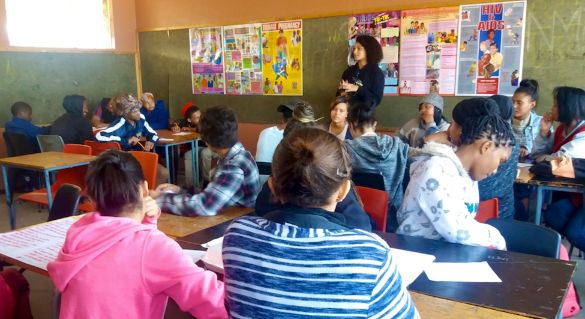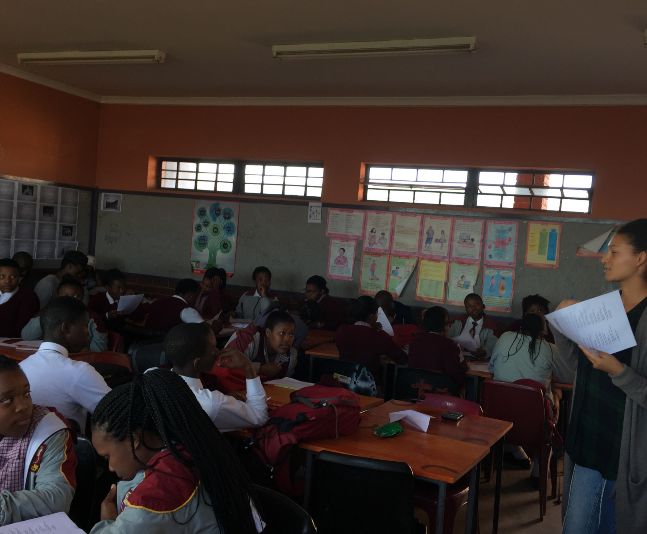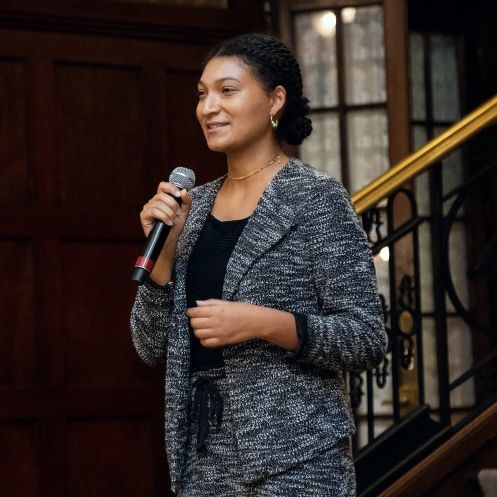A personal learning story about pads, education, and period poverty tying together in a cramped car in South Africa
Periods are expensive. Buying menstrual products every month can really add up and that’s if you have them available to you. In many places, period products are considered a luxury and even having safe and accessible sanitation facilities isn’t guaranteed. Period poverty has a major impact on the health and livelihoods of people who menstruate and contributes to gender inequity globally. For millions of people, the lack of access to menstrual hygiene essentials can cause serious delays in education and even lead to dropout.

Confronting period privilege
In 2017, I was working in South Africa with a not-for-profit organization that does amazing work supporting youth facing multiple barriers to access post-secondary education and employment. One day, we got a call from a university in the area that there was a donation of period products and, if we could pick them up, they could be distributed to our learners for free. We quickly drove over and were greeted by a mountain of pads divided into individual kits.
It was only as I was squeezing hundreds of pads into my boss’ very small car that I really thought about the severity of period poverty and its impact on education. It made me recognize my privilege as a person who is able to afford the products I need to be as comfortable as possible during my period. I was always frustrated at the unfairness of having to pay for menstrual products, but it was never a barrier for me to complete school, keep a job, or access other resources essential for my livelihood. For hundreds of millions of people around the world, access to period products and basic menstrual hygiene facilities isn’t a given.
How does period poverty impact education?

Period poverty is a widespread issue that affects about 500 million people globally (Chen & Kiefer, 2018). There are a number of factors that contribute to it including lack of access to water, sanitation, and hygiene (WASH), insufficient waste disposal and management facilities, the cost of period products, and the stigma associated with menstruation (Sánchez & Rodriguez, 2019). Around the world, period poverty is impacting access to education for women, girls, and all people who menstruate. Across Africa, as much as 10% of girls have their schooling interrupted because of their period. With some even being forced to drop out as a result, furthering gender gaps and creating increased barriers for young people (Williams, 2018). In India, over 80% of menstruators don’t have access to period products and more than 20 million girls stop attending school after their period starts (Olassa, 2020). For teens in the United States, a study found that 84% had either missed school because of their period or knew someone who had (Flannery, 2020).
Over 800 million people around the world menstruate every day, so menstrual equity is a widespread global issue (Sánchez & Rodriguez, 2019). Different governments, international institutions, and non-governmental organizations are tackling period poverty for students by providing menstrual products for free in schools, improving access to WASH for communities, providing education on menstruation, and leading campaigns to destigmatize periods. Many of these campaigns will also provide information on menstrual hygiene and keeping these areas clean to avoid infection.
Looking back, I’m grateful for that moment of realization in 2017. It was an opportunity to confront my privilege and educate myself on the impact of period poverty on education and gender equity more broadly. There is a lot of momentum already happening. Many more countries are talking more openly about menstrual equity in the workplace and what that means for menstruators. That said, there’s still a lot more work ahead to break down those barriers and make sure that women, girls, and all people who menstruate aren’t left behind.
Meet Sydney Piggott
Sydney is a Master of Global Affairs graduate and researcher with 10 years of professional experience in a variety of fields including international development, gender advocacy, corporate social responsibility, and youth leadership and education. She served as the ex director of programs for YWCA Canada and is currently director for community engagement at Elevate, a non-profit innovator for innovation in the social sector.

_____________
References
Chen L. & Kiefer T. (2018). #NoMoreLimits: Good menstrual hygiene empowers women and girls to rise. World Bank. Retrieved March 24, 2021 from: https://medium.com/world-of-opportunity/nomorelimits-good-menstrual-hygiene-empowers-women-and-girls-to-rise-baa1f2a45fc
Flannery M. E. (2020). Growing Awareness of “Period Poverty” in Schools. National Education Association. Retrieved March 24, 2021 from: https://www.nea.org/advocating-for-change/new-from-nea/growing-awareness-period-poverty-schools
Olassa A. (2020). Sustainable Period Products: Combating Period Poverty in India. Borgen Magazine. Retrieved March 24, 2021 from: https://www.borgenmagazine.com/period-poverty-in-india/
Sánchez E. & Rodriguez L. (2019). Period Poverty: Everything You Need to Know. Global Citizen. Retrieved March 24, 2021 from: https://www.globalcitizen.org/en/content/period-poverty-everything-you-need-to-know/
Williams H. S. (2018). South African Women Are Using Menstrual Cups to Change the World. Global Citizen. Retrieved March 24, 2021 from: https://www.globalcitizen.org/en/content/mina-cup-foundation-south-africa-period-poverty/
Popular reads on YPC
How to Talk About Your Period With Men
Talking about periods with male friends and co-workers doesn’t have to feel like unleashing landmines.
Read moreWhy and When Did Menstruation Become Taboo?
From the Yukon to Greece, taboos around menstruation have been around for ages and still…
Read moreSocial Media’s Important Role in Reducing Period Stigma
From the explosion of period art, to serving as an activist platform in the menstrual…
Read more